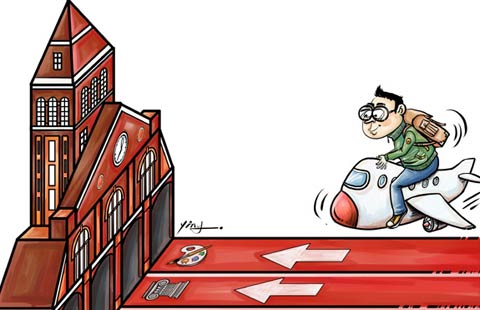Visa hopefuls bordering on despair as UK tightens policy
By Zhang Haizhou (China Daily) Updated: 2012-07-18 09:49Non-EEA applications
Apart from abolishing the post-study work visa, the UK government has also implemented more measures to limit the length of stay for international students, both while studying and after graduation.
For example, only overseas students enrolled in postgraduate courses lasting more than a year are permitted to bring dependents into the country.
The restrictions will also cast a long shadow over workers from countries outside the European Economic Area, a bloc that comprises members of both the EU and the European Free Trade Association. Four categories will be dramatically affected, including high-value immigrants and overseas domestic workers.
"We need to know not just that the right number of people are coming here, but that the right people are coming here. People that will benefit Britain - not just those who will benefit from Britain," said Damian Green, the UK immigration minister.
A number of factors have been cited to explain the introduction of tighter border controls. The most obvious is there have been complaints that immigrants are getting jobs and benefits at the expense of British people at a time when economic growth is still sluggish.
"Unemployment among recent British graduates is now about 20 percent. They already have to compete with European Union graduates. It is inexcusable that tens of thousands of jobs should go to foreign graduates without any requirement to test the local market first," commented Andrew Green, chairman of Migration Watch UK.
The think tank also said that foreign nationals occupy one in five of London's social housing properties, quoting data from the Office for National Statistics indicating that these families live in more than 350,000 council and housing association properties while British nationals occupy 1.5 million.
Green, who called the latest immigration statistics "very disappointing", has suggested that the UK government takes tougher measures in order to meet the targets outlined in the 2010 election campaign.
Caution urged
However, business and industrial leaders have urged the government to exercise great caution on immigration controls, especially as the country needs more foreign investment.
"It does look like the government's target of reducing immigration from a quarter of a million to tens of thousands by the end of this parliament (nominally 2015) is a very ambitious one," said Jim Bligh, head of Labour Market and Pensions Policy at the Confederation of British Industry, the UK's biggest business lobby.
"If they want to meet that target, we would urge them very strongly not to bear down on business immigration rates or those for student immigration, which we know are very popular among Chinese businesses and students," he said.
"But the perception is that the immigration system is not helping investment and is actively deterring (it). It's something the government has to tackle," Bligh added.
The overarching idea is that the government needs to send a message that Britain is open to Chinese business, visitors, and students, he said. "We have to give a warm welcome to people coming to Britain to do business and help our economy grow."
The complaints aren't just coming from the business community. The authorities have also been criticized for introducing "the harshest policy for 10 or 15 years" on family migration.
A number of changes came into effect on July 9, affecting non-EEA nationals applying to enter or remain in the UK under the family migration route.
The key change is the introduction of a new minimum income threshold of 18,600 pounds for people who want to sponsor UK settlement of a spouse or partner, or a fiance or proposed civil partner of non-EEA nationality.
"This is a policy that makes it rigidly uniform," said Xiang Sixing, a Chinese national who works for Visalogic Ltd, which provides professional advice to clients requiring assistance with UK immigration and visas.
Visalogic often helps Chinese clients, many of whom are applying for family migration or a partner visa. In some cases, British nationals were attempting to move back to the UK with the Chinese spouses they married while working abroad.
Despite many of them earning more than the 18,600 pounds annual threshold, they still found it hard to sponsor their spouse for a visa "just because they had not proper job offer in the UK temporarily".
"So they have had to stay apart. They are actually in a very good financial condition and won't live on welfare," Xiang said. "We hope they (the UK government) will introduce more policies to relax this rigid policy. But we are not confident."
Still without his passport, Wang Jianyu admitted he has "no choice but to wait".
"My initial plan was to get my passport back quickly and then spend the summer traveling back home and somewhere sunny. What will I do now? Enjoy the awful, rainy British weather," he joked.
Contact the writer at zhanghaizhou@chinadaily.com.cn
- Seven villagers murdered in N China
- China steps up tobacco control efforts
- Five jailed for separatism in Xinjiang
- Letter asks for leniency in poisoning case
- Antibiotics in surface water pose 'indirect health risk'
- Tianjin airport opens up transit link to Beijing
- High levels of antibiotics in China's major rivers
- China to dig tunnel for Asian rail system
- Bering strait line to US possible, experts say
- China: Stop oil rig harassment







